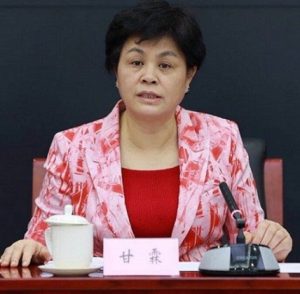China’s anti-monopoly regulator will step up legal enforcement as it builds up technological resources to tackle new economy issues such as online platforms, big data and biotech, its director said in an interview published on Sunday.
Gan Lin, chief of the National Anti-Monopoly Bureau, said some antitrust regulations remain rudimentary, while avenues of punishment for violators are limited.
“With the rapid development of the digital economy, and new industries and business models emerging one after another, there are great differences in competition modes between the new and the traditional economy,” Gan said.
“There’s an urgent need to further improve the anti-monopoly legislation and industry regulation,” she said in the interview, which was published on the State Administration for Market Regulation (SAMR) website.
China shed its once relatively laissez-faire approach by imposing a record $2.75 billion fine on e-commerce giant Alibaba Group Holding for abusing its market position.
Alibaba was found to have engaged in barring its vendors from selling on rival sites.
Sector-Wide Rectification
Gan said this practice was not evident during China’s annual “618 shopping festival” and Singles’ Day online shopping festival this year after the bureau kicked off a sector-wide rectification.
 In October, it levied a $527 million fine on food delivery giant Meituan for abusing its dominance.
In October, it levied a $527 million fine on food delivery giant Meituan for abusing its dominance.
“The orderliness of market competition has shown great improvement, and the smaller business operators have now gained broader space,” Gan said.
Gan, pictured left, added that the National People’s Congress, in passing antimonopoly laws, had faced difficult issues such as market definition and determination of market dominance. She singled out the pharmaceutical monopoly over price-fixing collusion involving manufacturers, primary distributors, secondary distributors and pharmacies.
“This resulted in a significant increase in drug prices and severely harmed the interests of consumers, said Gan, a former potato scientist who had previously been SAMR’s deputy head.
“By imposing administrative penalties on the parties, the prices of medicines will return to the level of competition, the interests of patients will be protected, and the burden of seeking medical care will be reduced,” she said.
Gan said the bureau would establish its own big data centre to strengthen antitrust and competition policy theoretical research and technical support.
- George Russell
READ MORE:
China’s antitrust watchdog to pull plug on Tencent’s videogaming mega-merger
Didi pressing on with mega-IPO despite antitrust violations probe
Amazon Follows Flipkart in India Supreme Court Antitrust Probe Challenge
























